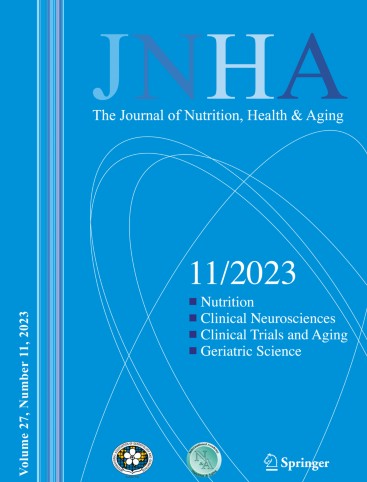饮食炎症潜力、抗氧化能力和地中海饮食依从性与生物衰老的差异关联:英国生物银行研究
IF 4
3区 医学
Q1 GERIATRICS & GERONTOLOGY
引用次数: 0
摘要
生物衰老不同于实足年龄,显著影响慢性疾病风险,是卫生干预的关键目标。虽然饮食被假设通过炎症和氧化途径影响衰老,但来自大量人群的系统证据仍然有限。为了解决这一差距,我们使用了英国生物银行的数据和补充饮食指数来评估炎症和抗氧化特性,为饮食与衰老的联系提供了全面的见解。方法:在这项横断面研究中,我们分析了46,755名英国生物银行参与者的数据。通过饮食炎症指数(DII)、复合饮食抗氧化指数(CDAI)和替代地中海饮食(aMED)评分分别评估饮食炎症潜力、抗氧化能力和地中海饮食依从性,这些评分来源于24小时食物消耗报告。采用klemera - double法测定生物年龄(KDM-BA)和表型年龄(PhenoAge)。进行了多元线性和逻辑回归、限制三次样条模型和中介分析,调整了广泛的混杂因素。结果促炎饮食(较高的DII评分)与生物年龄加速显著相关(KDM-BA: β = 0.39;表型:β= 0.96,均P <; 0.001),而富含抗氧化剂的饮食(较高的CDAI评分)和地中海饮食(较高的aMED评分)呈负相关(CDAI: β= - 0.33至- 0.50;结果:β = - 0.31至- 0.60,P均为0.001)。Logistic回归证实,坚持服用阿米德可降低生物年龄加速的几率(OR: 0.68-0.69, P < 0.001)。剂量-反应分析显示,DII与表型加速呈非线性正相关(p非线性<; 0.001), CDAI呈非线性负相关(p非线性≤0.016),aMED呈近似线性负相关(p非线性≤0.035)。中介分析表明,DII和CDAI分别占aMED与生物年龄加速关联的15.7%-50.4%和15.0%-20.2%,突出了抗炎和抗氧化机制在延缓衰老中的作用。结论本研究提供了强有力的证据,表明饮食的促炎潜能、抗氧化能力和地中海饮食依从性与生物衰老具有独立和不同的关联。促炎饮食与加速衰老有关,而富含抗氧化剂和地中海饮食与减缓生物衰老有关。中介分析表明,地中海饮食的好处部分是由其抗炎和抗氧化特性介导的。未来的研究应采用纵向设计来建立因果关系和阐明机制,将饮食定位为健康老龄化的关键可改变因素。本文章由计算机程序翻译,如有差异,请以英文原文为准。
Differential associations of dietary inflammatory potential, antioxidant capacity, and Mediterranean diet adherence with biological aging: A UK Biobank study
Background
Biological aging, distinct from chronological age, significantly impacts chronic disease risk and is a crucial target for health interventions. While diet is hypothesized to influence aging through inflammatory and oxidative pathways, systematic evidence from large populations remains limited. To address this gap, we used UK Biobank data with complementary dietary indices assessing inflammatory and antioxidant properties, providing comprehensive insights into diet-aging links.
Methods
We analyzed data from 46,755 UK Biobank participants in this cross-sectional study. Dietary inflammatory potential, antioxidant capacity, and Mediterranean diet adherence were assessed using the Dietary Inflammatory Index (DII), Composite Dietary Antioxidant Index (CDAI), and Alternative Mediterranean Diet (aMED) scores, respectively, derived from 24-h food consumption reports. Biological age acceleration was quantified by Klemera-Doubal method biological age (KDM-BA) and phenotypic age (PhenoAge). Multivariate linear and logistic regressions, restricted cubic spline models, and mediation analyses were performed, adjusting for extensive confounders.
Results
Pro-inflammatory diets (higher DII scores) were significantly associated with increased biological age acceleration (KDM-BA: β = 0.39; PhenoAge: β = 0.96, all P < 0.001), whereas antioxidant-rich diets (higher CDAI scores) and Mediterranean diets (higher aMED scores) showed inverse associations (CDAI: β= −0.33 to −0.50; aMED: β = −0.31 to −0.60, all P < 0.001). Logistic regressions confirmed that aMED adherence reduced odds of biological age acceleration (OR: 0.68–0.69, P < 0.001). Dose-response analyses revealed nonlinear positive associations between DII and PhenoAge acceleration (Pnonlinear < 0.001), nonlinear negative associations for CDAI (Pnonlinear ≤ 0.016), and near-linear negative trends for aMED (Pnonlinear ≤ 0.035). Mediation analyses indicated that DII and CDAI accounted for 15.7%–50.4% and 15.0%–20.2%, respectively, of the association between aMED and biological age acceleration, highlighting anti-inflammatory and antioxidant mechanisms in delaying aging.
Conclusion
This study provides robust evidence that dietary pro-inflammatory potential, antioxidant capacity, and Mediterranean diet adherence exhibit independent and differential associations with biological aging. Pro-inflammatory diets are associated with accelerated aging, whereas antioxidant-rich and Mediterranean diets are associated with decelerated biological aging. Mediation analyses reveal that the Mediterranean diet’s benefits are partially mediated by its anti-inflammatory and antioxidant properties. Future research should employ longitudinal designs to establish causation and clarify mechanisms, positioning diet as a key modifiable factor for healthy aging.
求助全文
通过发布文献求助,成功后即可免费获取论文全文。
去求助
来源期刊
CiteScore
7.80
自引率
3.40%
发文量
136
审稿时长
4-8 weeks
期刊介绍:
There is increasing scientific and clinical interest in the interactions of nutrition and health as part of the aging process. This interest is due to the important role that nutrition plays throughout the life span. This role affects the growth and development of the body during childhood, affects the risk of acute and chronic diseases, the maintenance of physiological processes and the biological process of aging. A major aim of "The Journal of Nutrition, Health & Aging" is to contribute to the improvement of knowledge regarding the relationships between nutrition and the aging process from birth to old age.

 求助内容:
求助内容: 应助结果提醒方式:
应助结果提醒方式:


